Love your neighbor? Turning the other cheek? None of these things. Polish extremists tried to build a dictatorship no less ruthless than the Nazi one. In addition, they claimed that ... that's exactly what God wants.
The openly fascist National-Radical Movement (colloquially:ONR "Falanga"), which functions to this day, was created as a result of a split in the National-Radical Camp, which has been operating since 1934. The group, led by Bolesław Piasecki, outstripped other nationalist groups in its radicalism.
Its members, the so-called "bepists", who are supporters of "national egoism", became famous, among other things, for the postulates of introducing bench ghettos and the principle of numerus clausus at Polish universities. Limiting the number of students of Jewish origin, as well as the vision of creating the Polish Organization of Cultural Action, aimed at the nationalization - "revival" - of Polish culture.
The vision of the nationalists under the sign of the Falanga fully manifested itself only in the concept of the Catholic State of the Polish Nation. It was announced and adopted during a solemn mass, during the pilgrimage of national movements to Jasna Góra in May 1936. The postulates of KPNP boiled down to proposing a totalitarian system based on ... the Catholic faith! Paradoxical as it may seem, the creators of the concept did not see any contradiction between them.
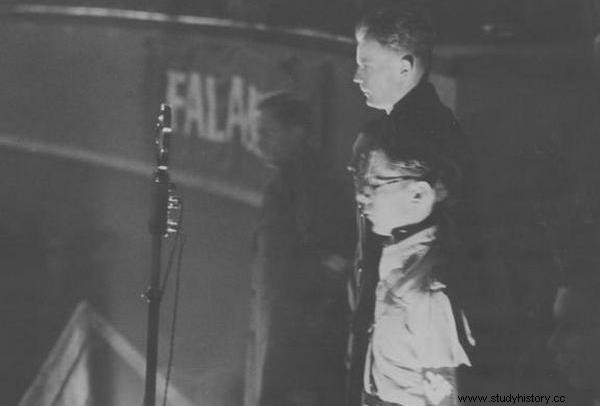
Bolesław Piasecki (in front of the microphone) during the great rally of the ONR "Falanga" organized on November 28, 1937 in the Staniewski Circus in Warsaw (source:public domain).
Catholic totali (tary) zm
Basing the concept of KPNP on Catholic principles resulted from the synthesis of Catholicism and nationalism that is characteristic of "Falanga". The main ideologists of the movement - Jan Ludwik Popławski, Zygmunt Balicki and, of course, Roman Dmowski, emphasized that the overarching bond of Poles was, is and must be the Catholic faith. In this way, national ethics became de facto Catholic ethics. As Dmowski wrote:
The Polish state is a Catholic state. It is not because the vast majority of its population is Catholic (...) but our state is a nation-state, and our nation is a Catholic nation .
At the same time, it was not individual individuals, but the state that were to be responsible for the salvation of the nation - it claimed the right to exercise power over the consciences of citizens by interfering with every area of their lives. Nationalists strongly opposed the democratic system, considering it a "Jewish bastard of the nineteenth century." The cure for the entire "Masonic-Jewish" misfortune of Poland was to introduce the "ravishing masses into the heroic efforts" of Catholic "totalizm".
The Montesquieu's principle of the separation of powers was also dealt with:its rejection was to resolve potential conflicts in the area of the rule of law. Particular emphasis was placed on the need to integrate the judiciary into government structures. This is how Poland was to transform into the Catholic State of the Polish Nation
Salvation through the nation
The nation was understood by "bepists" in a way, at least from today's point of view, not obvious. He was described as a "moral person", an emotional community of individuals who profess the same system of beliefs and ideas, as the highest goal of man who recognize salvation. It was to be achieved by building the power of the nation.
Interestingly, belonging to a nation was not dependent on the place of birth - for example, the Polish landed gentry of Lithuanian and even Tatar origin was recognized.
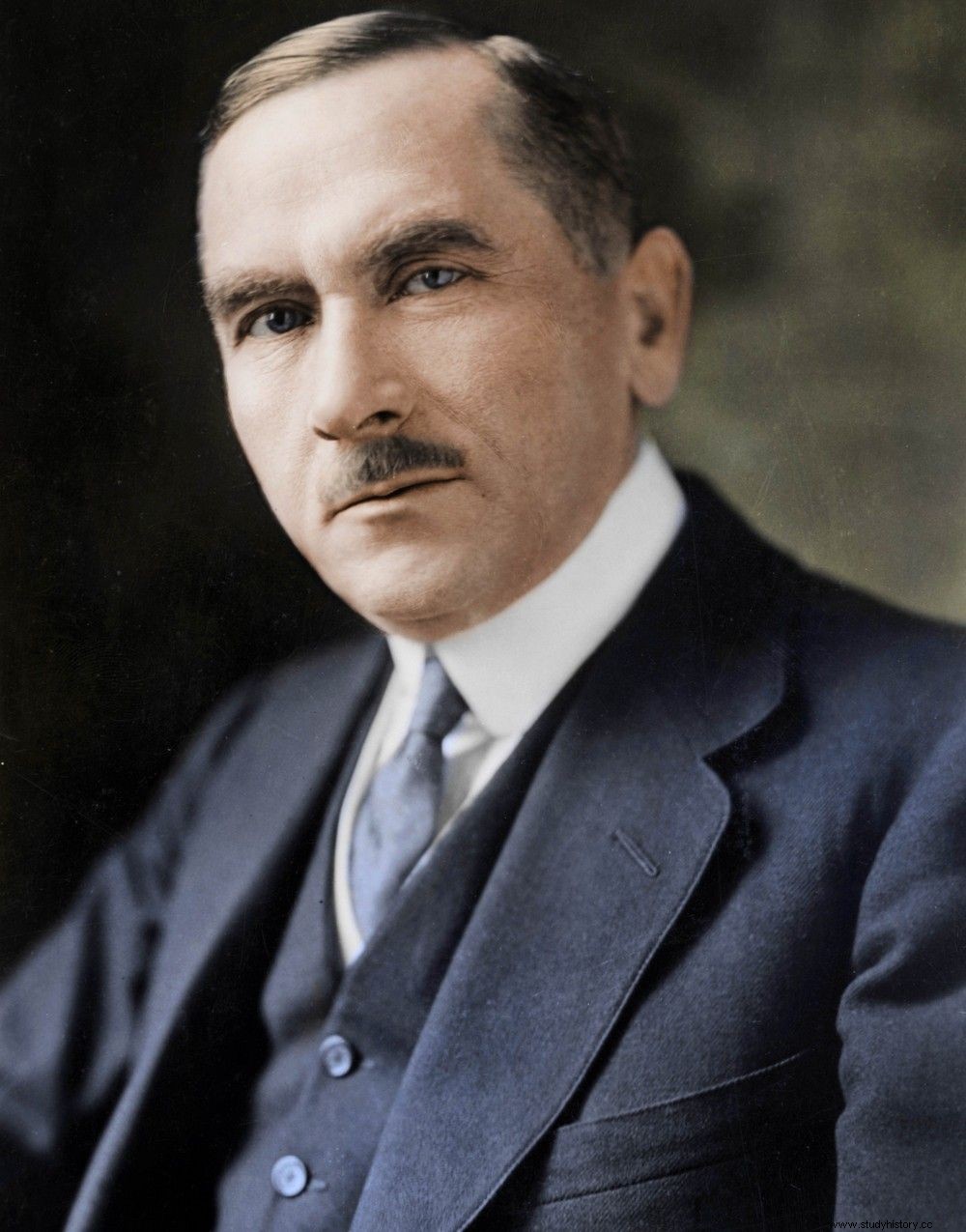
Mainly, the ideologists of the Polish national movement (including, of course, Roman Dmowski) emphasized that the overriding bond of Poles was, is and must be the Catholic faith (source:public domain).
The condition for being a Pole was full assimilation, i.e. recognition as a Polish citizen and respecting the principles of the Catholic faith. Sounds beautiful? However, there was an important exception resulting from anti-Semitism deeply rooted in Polish nationalist thought. Jews were considered completely incapable of assimilating with any nation, because ... their degenerate souls could not change anything ! As in other totalitarianisms, also here the term internal enemy was an additional factor holding the nation together.
Advocates of false truths
Although the main ideologists of Polish nationalism emphasized their uniqueness compared to other national movements in Europe, they did not hide their admiration for both Italians and Germans. What was, in their opinion, the fundamental difference between their conception and other totalitarianisms?
This article has more than one page. Please select another one below to continue reading.Attention! You are not on the first page of the article. If you want to read from the beginning click here.
Well, German Nazism (Hitlerism), Italian Fascism and Russian Bolshevism were to be "evil totalizm" because they "served a false truth" - the cult of the individual, the myth of racial superiority or the idea of a classless society. On the other hand, "good totalizm", that is, of course, the Phalangist one, realized, as Marian Reutt explained, the highest goal of man - salvation. In this respect, the Polish nationalists were closest to the Spanish phalanxes Primo de Rivera and Franco.
You are worth what you bring to the life of the nation
Jan Józef Lipski emphasizes that the name of the Catholic State of the Polish Nation, imposing associations with the Roman Empire of the German Nation, proves the fascination of the “Falanga” ideologues with the idea of a medieval religious state. The basis of KPNP, whose creators had such an ideal before their eyes, was the rejection of equality and the rights of individuals, because these were only a complication and an obstacle on the way to building the greatness of Poland.
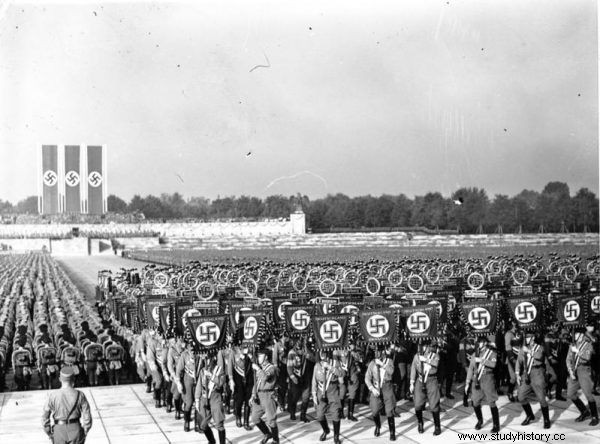
Polish nationalists emphasized that their ideology differs from, for example, Nazism in that it does not serve "bad truth" but strives to save man. The photo shows the NSDAP congress in Nuremberg (source:Bundesarchiv; lic. CC-BY-SA 3.0).
The measure of a person's value was his contribution to the work for the nation; the size of this contribution determined the place of man in the hierarchy. Equality was to be expressed in the fact that people with similar intellectual qualities and similar character traits were to occupy the same places in the hierarchy.
Belongs and excluded
The question is, what civil rights could individuals have in this individualism-denying society? Well, these would be successively:the right to initiative in local government, military service, economic activity and ... joining the Political Organization of the Nation, which is the only legal party! The clever trick of the nationalists was that the condition for gaining full rights was joining the OPN. Thanks to this, the Catholic State of the Polish Nation was to be ultimately free from nonpartisan people.
Moreover, the natural consequence of ONR hierarchy would be the inequality of individuals before the law - after all, since the responsibility of the most outstanding individuals is disproportionately higher, the scope of their rights had to be proportionally wider. The law was to apply as long as it was consistent with the principles of faith and conscience of a Catholic.
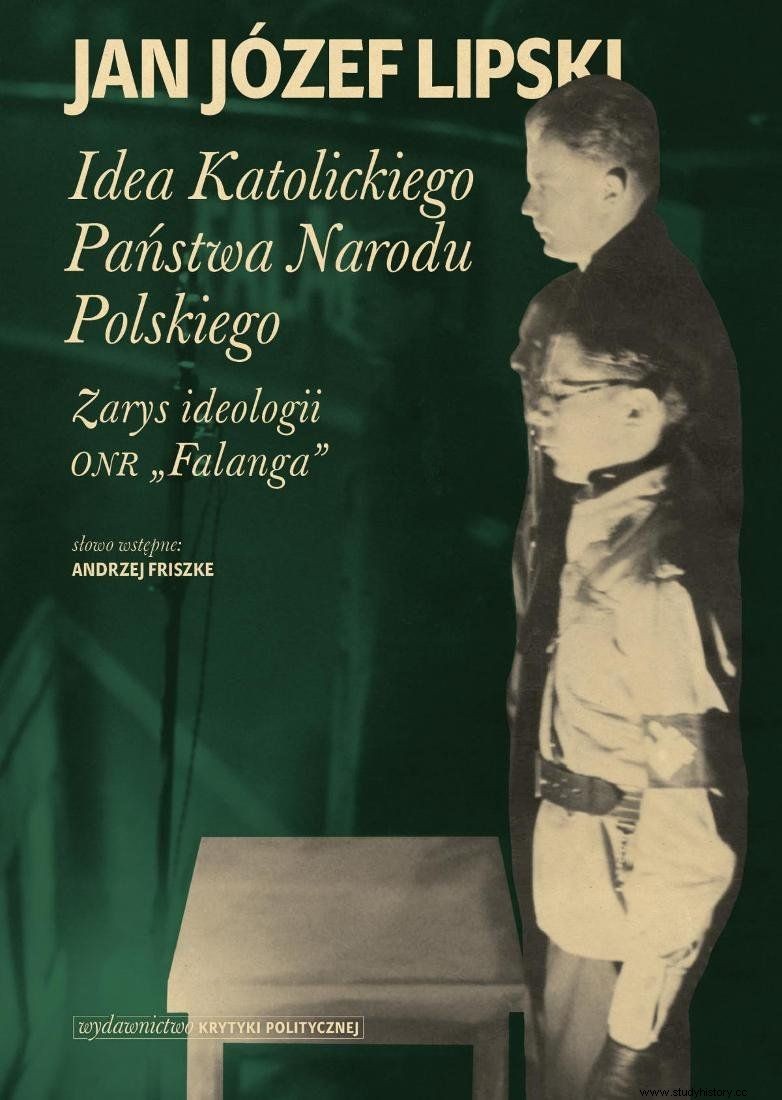
What about those who rejected the common goal? They lost their citizenship status, becoming state-owned individuals deprived of any civic rights. It seems that it was a category created mainly for people of Jewish origin ...
Non-Catholic Catholicism
The Catholic state should, at least in theory, fully respect the autonomy and freedom of the individual. Meanwhile, the concept of the CPSU narrows the concept of a citizen to people who feel that they are serving the country, realizing the social mission of the church. The rest, as if at their own request, would be banished. In addition, one of the basic principles of Catholicism - love of neighbor - has been modified so that it confines itself to the narrowly defined notion of "nation". Was the vision of KPNP really in line with the principles of Catholicism? As Lipski wrote:
Terror is born of hatred and hatred is born. The accompanying ideology, built on hatred, was self-defined, illegally in my opinion, as Catholic with a weak and rare opposition from the Church.
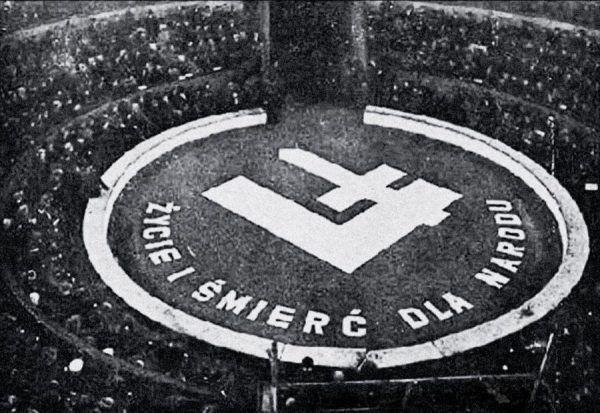
According to the ideas proclaimed by the ONR "Falanga", all those who rejected the common goal lost their citizenship status. The photo shows the "Falangi" rally in the Staniewski Circus (source:public domain).
Probably many people will consider the concept of the Catholic State of the Polish Nation an absurd dream, but it is impossible to avoid comparing it with the demands of the opponents of the separation of state and church. After all, there are also those who see Poland today as the "Land of Christ", a lonely island in the sea of the pagan world.
Until recently, these voices seemed rather marginal, typical for radical groups such as All-Polish Youth, which in its declaration in the first point recognizes "God's law as the supreme law". Currently, however, they appear in the public discourse more and more often. So it might be worth listening to Lipski's words and asking if the KPNP itself had so much to do with Catholicism as "people's democracy" with democracy.
